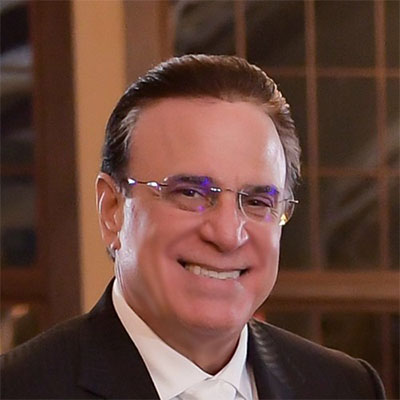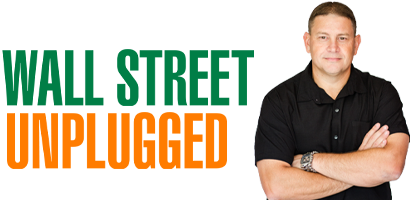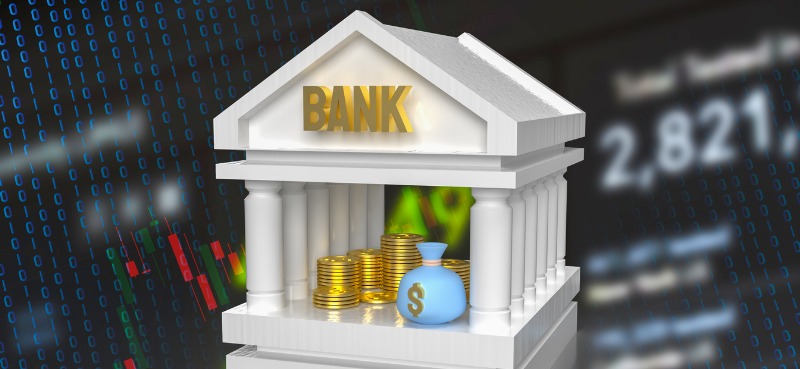I’ve said it before and I’ll say it again—security tokens have the potential to change the world as we know it.
First-time guest Steve Rosamilia, founder and CEO of IMEX USA, has 35 years of experience in computer startups, commodities, and FX trading. He even holds a seat on the Chicago Board of Trade (CBOT).
And right now, Steve is planning a security token offering (STO) to raise capital for a special mission: to serve the two billion people around the globe who don’t have access to banking services. [5:42]
I don’t have an educational segment today because I’m recovering from hip replacement surgery. Don’t worry—I’m doing great and will be back to my regular format next week.
Wall Street Unplugged | 688
Security tokens could revolutionize banking for billions of people
Announcer: Wall Street Unplugged looks beyond the regular headlines heard on mainstream financial media, to bring you unscripted interviews and breaking commentary, direct from Wall Street right to you, on Main Street.
Frank Curzio: How’s it going out there? It’s September 25th, and I’m Frank Curzio, host of the Wall Street Unplugged podcast where I breakdown the headlines, and tell you what’s really moving these markets.
So guys, I’m going to let you in on a little inside information here. Inside information the words you’re never supposed to say in my line of business, but as I’m to do with stocks. First is, today’s podcast is not going to include educational segment, sorry to disappoint. Just going to include a really, really awesome interview, first time guest, can get details in a moment. But the reason why there’s no educational segment going to keep this podcast simple is because I just got hip replacement surgery. So I’m in the hospital actually right now as you’re listening to this, just taping it a date early along with the interview.
I think I mentioned hip replacement surgery in the past. I didn’t really mention when I was going to get it. But I really didn’t want to make a big deal of it especially to you guys who are lifetime members and CEO, Curzio Equity Owner token shareholders, because you guys have a lot of stake in the game. And I know every time I say I had back surgery a couple of years ago, and again, I’m 100%, I’m fine with that. I can’t wait to get the hip replacement surgery, because I’ve been in a lot of pain for a while now, it’s a very high rate, well, high success rate, really easy surgery now compared to maybe about 10 years ago. But technology’s amazing behind it.
But I didn’t really want to mention, I know you guys probably sent me the best orthopedic surgeons out there, sent me the best doctors. I just didn’t want to worry anybody, because it is kind of like a, I wouldn’t say it’s not a simple surgery, it’s a big surgery, but it’s again, very high success rate, very common. And my doctor told me I’m probably going to be in less pain when I wake up from the anesthesia compared to the pain I’m in right now, which is pre-surgery.
The recovery time is like a month. First week I’m walking with a cane and next is a Walker and then a month I’m walking around without limping probably. And then she said, whatever you do, don’t do any high impact sports anymore like basketball, which means in about six months, I’ll go back to playing basketball. So guys are always going to do this. Even girls, guys, you do what you love, right? It’s hard not to, when someone tells you can’t really do something that you’ve done, and you feel like you’re good at, and you love. But again, I’m going to take it easy and be smart about it and not rush anything back.
But yeah, everything’s going to be on schedule after this. I think it’s like one to two days I might be in the hospital for, then you’re walking right after the surgery. So again, it’s just a matter of process of your bone accepting the hip, building it and getting strong and strong, and going into the rehab process, which I have all set up and everything. So I didn’t want to worry anybody. But as you know, I never miss a podcast even when I’m getting surgery like this, which is really cool. So I did put this together for you. Awesome first time guest, his name is Steve Rosamilia.
Steve is founder, CEO IMEX and CEO IMEX USA, which is the owner of iBank. He has over 35 years of experience working for numerous startups entire career, especially in technology sectors since early seventies, experienced programmer. He is also a commodities and FX trader and he held a seat on Chicago Board of Trade, which is pretty cool. But Steve is now also the founder and CEO of iBank, which falls under the IMEX brand. And it’s a new company launched with several of his long-term partners that plans on bring free banking to everyone who doesn’t have it across the globe, which is pretty close to 2 billion people. It’s a lot of people, right? 7.5 billion live in the world. 2 billion don’t have access to a bank account or anything and they’re launching a company that’s going to give these people access to this, and it’s going to be free.
I know you what you’re thinking, “Well, if they’re launching this new company, how are they going to make money? He’s going to cover everything in detail. I like Steve. It’s not because he’s a pizon, he’s Italian like me. No, he’s actually very smart, has a ton of experience in technology and also in the banking industry, and I truly love this idea.
This is an idea that you may or may not want to invest in where you’re getting in on the ground floor, and he’s going to talk about that too. How so many, he’s been in technology’s sector such a long time with some of these IPOs, they come out with multi-billion-dollar valuations where a lot of that of course it’s already taken place. It’s a lot different. Now the reason why I’m bringing him in front of you is because he’s thinking of raising money through a security token offering. So through someone that we know, which is a third party, he has come to me and asked me a bunch of questions, the positives, negatives. And Steve is just one of dozens and dozens of people where my phone’s ringing off the hook in how to do this, and they want to go this route. And it’s pretty exciting that we’re in this position where we’re going to see a lot of these.
And I want to present this idea to you cause Steve’s a great guy, he’s brilliant, he’s smart, he’s got a finance background, and he may be launching this in a security token offering, which would give a lot of people, credit investors, an opportunity to get into this if they want to. And or just regular investors, you only going to have to wait one year if they decided to do this, because although trading on security token exchange, where you can get it still at a very, very, very early stage. So really, really great interview coming up. He’s going to explain the idea to you thoroughly. You may like it, you may not. But for me I just want you to think that this is just one of tons of ideas in a security token market that you’re going to see through our firm where you have the opportunity to invest in truly early stage startups, which most people are not going to have access to.
So a lot of fun, great interview coming out, really exciting stuff. And you know what, let’s get to the interview with Steve right now.
Steve, thanks so much for joining us on Wall Street Unplugged.
Steve: Frank, thanks for having me.
Frank Curzio: I’m going to start with a wonderful question because I hate when people ask me this question, but it’s important since you’re a first time guest, because I’m not a guy who loves talking about myself, tell us a little about yourself, your background. Again, you’re a first time guest, people want to learn about you. Tell us about yourself.
Steve: Well, I was very, very lucky to get an opportunity to break into the technology business back in the mid-seventies. It was not my career choice. I was going to be a lawyer. Fortunately, I changed that path. And then eventually, I started to migrate over to the financial sector and I combined my training in technology with the markets and developed some algos before anybody even knew what algos were, and developed some trading programs.
Eventually that morphed into a permanent career in the trading business, which involved commodities and foreign exchange and treasury bonds. And that’s kind of what morphed into what we’re doing today.
Frank Curzio: And let’s get into that because of the past 20, 30 years, I mean, even Morgan they say seventies, the amount of changes we’ve seen in technology, I don’t need to explain. But more importantly, it’s not just technology, but also, a little bit on the banking side and the payments side. Talk about some of the changes you’ve seen over your career and how different of a market this is, especially over the last 15 years where everything is digital now.
Steve: Yes. It’s the amount of innovation that’s been seen in the financial sector. I mean, it’s evident by the fact that it now has its own name, FinTech, has been dramatic. The only problem is there’s a significant component of the global population that’s being excluded from all this “innovation,” and that’s the fore. And most people don’t realize that there are 1.7 billion people on the planet that don’t have a bank account and consider what your life would be like if you had to function without a bank account or strictly on cash. Most people think that’s a third world country problem. And surprisingly enough, there’s over 30 million people right in the good old USA, that don’t have a bank account.
And, statistically, it’s estimated that an average family of four will spend the equivalent of eight week’s worth of groceries on the alternatives to not having a bank account. Like check cashing fees, money order fees, prepaid debit card, bill paid, wire transfer, postage and all the peripheral things, like discounts you can’t get. It’s actually called the poverty penalty. That’s where we focused our attention because it’s a huge market and certainly, those people spend the money. So, it’s an opportunity that’s waiting to be taken advantage of. And I don’t mean that in a bad way, I mean in a good way. Because whatever we can do to bring that group of people into the digital world of commerce, the better off everybody else is going to be. They represent a buying power of over a trillion dollars. And that’s pretty significant.
Frank Curzio: Talk about how you’re going to do this because you have been part of startups throughout your entire career. And when you talked to me, I think we spoke the first time maybe a month ago, your new venture has a lot of… pretty excited myself, which is called iBank. Get into that a little bit of how this company is going to… talk about how it’s going to help the problem that you just said. What was it? Close to 2 billion. Even those numbers I think are a little bit higher where a lot of these people don’t have bank accounts.
Steve: That’s right. And the problem with that number is of the 1.7 billion people that don’t have a bank account, half of them, over a billion, don’t have the requisite technology to access all of these innovative new banking programs. And that requisite technology is a smart phone. A lot of people have cell phones, but they don’t have smart phones. And it is the smart phone that’s needed in order to take advantage of a lot of these new innovative banking products.
So we focused on that market and we said, “Well, how are we going to get these people? If they don’t have the technology, how are we going to incorporate them into a digital world?” And we looked at the types of non-technological services that they were taking advantage of now. And the one that actually sticks out amongst all of them is Western Union, because they use that a lot in order to send money, to transfer money to family members to pay their bills.
So if you look at the Western Union model, it’s an agent model. The person goes to the store and they give the merchant their money. The merchant then through a number of bank transactions, gets that money to its ultimate destination. Well, the problem with that methodology is, there’s so many fingers in the pie that need to be paid. And that’s why those services are very expensive. So we just tried to figure out a way that we could accomplish the same thing, but eliminate all the fat and all the fees.
And basically the way we do that is by incorporating the merchant into an ecosystem, our financial ecosystem with no middleman. It’s just us, our network and the merchant. And the merchant actually becomes an agent of iBank. To use an analogy, if you’ve ever used a debit card and you go into a store, you make your purchase, one of the questions that you’re asked on the POS system, the point of sale machine is, “Do you want cashback?” Well that’s a banking function, it’s not a commerce function. You’re withdrawing money from your bank account and you’re actually using the merchant as the conduit to get that money.
So we thought, “Well, if you can do that, why couldn’t you do other aspects of banking like make a deposit?” Give the merchant money and have them put it in your bank account. Or give the merchants your paycheck and have them register it to your bank account. Or use the POS system to pay a bill, or to send money to somebody else. And that’s exactly where we started from. And that is exactly how iBank works. It brings transactional banking to the point of sale.
Frank Curzio: When I spoke to you about your model, you were saying you’re going to offer these products for free and you’re going to get this question from everybody. And you could say about Facebook when they offered everything for free, waited for them to have billions of people on the account, and they found ways to make money off of it. But talk about the business model because when people look at a startup and they say, “Well, we’re going to offer this for free first,” they may get a little nervous. But it’s even a question I asked you, share that with us because providing a free service is going to get you a ton of customers there, but at the end for investors, they want to see, when are you going to be profitable, the timeframe. Talk a little bit about that and get a little more detail as you can.
Steve: Absolutely, no problem. There is no company that can ever function without revenue. And there are a lot of models out there that have been very successful on what’s called a freemium structure. But a freemium structure implies that the initial customer gets some component of the service for free in the hope that he will upgrade to a more expensive service. LinkedIn is a perfect example. When LinkedIn first started, they had tremendous problems generating any revenue because they were having a tough time getting people to upgrade, but eventually it worked out. And the proof is in the pudding. What did LinkedIn sell for? $26 billion.
Our model is slightly different. What we basically do is we defer the cost of running the network onto others and not the consumers. And yes, ad revenue is going to be one significant component of our revenue model, but we do charge the merchant a maintenance fee. But it isn’t structured the way that most credit and debit card fees are today, which is a percentage. Actually, it’s more than just a percentage. There are PCI fees, network fees, swipe fees. I mean, there’s a dozen different fees that go into a transaction that could equate to 10%, 12%, 15% of the merchants’ revenue. Ours is a flat fee. It’s the same fee every month and it’s very, very low. And it’s only designed to allow us to maintain the network. It’s a fee that any merchant, even a micro merchant, which is a very, very small merchant could afford. So it’s consistent. They can count on it. They don’t have to worry about whether it’s going to go up or it’s going to go down. That’s the second area where we make revenue.
The third area that we make revenue is, one of the components of the services that we provide is cross border remittances. Because every member of iBank has access to every other member and that’s regardless of where they live on the planet. So, if you’re a US member, you have a relative who lives in India and they’re a member, you can do transactions between your two accounts. And again, it’s all free, there are no fees to the consumer whatsoever. But in the transaction of a currency exchange, there’s a built-in, what they call spread. That is a component of the way the industry functions. Everybody pays it, even banks do. It is a built-in profit margin that we realize. And again, it’s not a fee that the consumer pays directly, nor is it a fee that the consumer can avoid by going to anybody else.
And in fact, services like Western Union and even commercial banks, big banks, charge exorbitant spreads. So we intend to cut that margin down to the point where our currency exchange will be highly competitive to the consumer above everybody else, but it does derive revenue for us. And then eventually over time we’ll be able to provide analytics just like Facebook does, just like LinkedIn does. And again, that’s something that will come as the network grows and as more people join it.
Frank Curzio: Steve, we got in touch because we share a friend, third party who introduced you to me because I launched a successful security token, and you would think about going this route. Could you explain that, going the security token route actually to raise money? You asking me questions about it, I’m not too sure if that’s the direction you’re going to take or not, or how are you going to structure it, Reg D, Reg A, I guess whatever it is, but definitely interested in a security token last time I talked to you, I wanted to get your thoughts on that. And is there a possibility that you are going to go that way or is it just going to be just a typical traditional way of raising money?
Steve: Well, we’re seriously looking at it. And I have to be honest about it. When the whole idea of security tokens was first floated, we were against it. We just thought that it would be fraught with problems, but it seems like it’s matured quite a bit. And I think the problem is that the security token was preceded by the coin opportunities, the ICOs, which is, unless you’ve been living under a rock, everybody knows they’re just fraught with fraud and all kinds of nonsense. So, I think that because that preceded the evolution of the security token, a lot of people are jaded.
But we’ve had numerous conversations with our counsel, and it’s a big international firm, it’s well-respected and we respect their opinion. And there are a couple of firms that have come out, security token exchanges that have gotten registered with the SEC. And you’ve got to believe that if the SEC says it’s okay, then it shouldn’t be a problem. It goes without saying that those tokens have to be legitimate securities. It’s simply the way they’re being sold that’s different. They have to be registered as Reg As or, Reg Ds or CS. And when you sell those tokens on that exchange, you have to comply with the regulations of those classifications. So nothing has really changed. It’s simply the vehicle that you’re using to get the security to the purchaser.
But the reason why we’re looking at it seriously is because potential overseas buyers really like it, particularly when they’re buying US securities. So floating that tokenized security opens up a whole new market for investors. And that’s why we’re doing it.
Frank Curzio: It definitely makes sense. And I guess that that’s going to lead to my next question because everybody knows about Libra, right? Libra’s launch with Facebook and now we’re looking at it saying, a lot of scrutiny out there on about it, but is iBank got to be or what you’re trying to do there, related to Libra, which is kind of like a payment service for everybody out there. Again, it still need lots of approvals, but they have tons of customers lined up that are partnering with them. And to me I think there’s definitely going to be a go. How is iBank different from, or what you’re trying to do, from Libra?
Steve: Well, first of all, iBank uses a digital representation of fiat currency. It is not in any way to be construed as a cryptocurrency. And blockchain is not a component of our network. I’m not poo-pooing blockchain. Blockchain is a great technology, and it’s going to find its way into a lot of different industries. And people tend to associate blockchain and Bitcoin as one and the same and they are not. As far as Libra is concerned, Libra is just another crypto currency. I don’t see it as being any different from Bitcoin aside from the fact that they claim that it’s represented by baskets of currencies. But there are so many potential pitfalls to that and time doesn’t permit that we go into them, but a little bit of research on anybody’s part, they’ll find them.
And I think if you consider the way that cryptocurrencies have behaved since their release in 2009 with the Nakamoto paper, the original intent was great. The problem is that it just didn’t work out as planned. And the main reason for it not being effective as a medium of transfer in commerce is volatility. Just to give you an example, I mean, if anybody who’s looked at a Bitcoin price chart knows what kind of volatility it possesses. This may be a kind of a pedestrian example, but if you were to go into Starbucks and buy a latte with Bitcoin, before that coffee gets cold, somebody in that transaction got screwed. So how can you run your business based upon a payment method like that. And there hasn’t been one single crypto currency, and that includes those that claim to be connected to fiat currencies, that has been able to solve that problem, the volatility. I don’t think Libra is going to either.
They say that they have methods that they can employ to stabilize the price. But the mere fact that they have to say that they have that is pretty scary. Why do you have to stabilize the price? When you walk out of your home in the morning, you know exactly what’s in your wallet and what it’s going to buy you for the most part. Needless to say, fiat currencies are affected by the rise and fall of inflation and interest rates and other things, but we’re all in the same boat and that’s the difference between fiat currencies and cryptocurrencies, not everybody’s in the same boat.
Over and above all that, without putting that aside, this is still something that is going to require that the participants have a certain amount of sophistication and a certain amount of technology. All that having been said, I don’t think anybody’s going to argue with the fact that cash is king, and it will always be king. The problem is, if you can’t find somebody to accept that crypto currency or that token or whatever they want to call it, as a form of payment, then what’s going to happen? You’re going to buy that token with real money, you’re going to give that token to somebody else, that person’s going to want real money. So, that person’s going to have to convert the token back to real money again. Well, there’s fees involved in that whole transaction, so, what’s the point? To answer the question, no, we’re nothing like Libra and I think that’s the success or failure that is in the future.
Frank Curzio: Now, when we were raising money for our token, there were venture capitalists that were interested and it was kind of like pretty much a funny process. Because these guys were like, “Yeah… ” I mean, they didn’t even care about my company, just cared about the deal that they were going to get, which you’ll hopefully get a discount to get token and blow out day one. And again at, we were fortunate to be in a position to strange, we’re a real company, we generate revenue. And I told him… you know what I him, I come from New York. But talk about your experience with venture capitalists because I think it’s had to do with security token. And you were talking to me and saying, “Is every person liked this or whatever.” But I think it was a young person. Tell that story because I was literally laughing in my chair when you brought these guys and what they said to you.
Steve: Well, first of all, we made the mistake of going out to Silicon Valley to try to raise money for a company that’s in the FinTech industry. They don’t understand finance, they really don’t. I mean, it’s kind of shocking, they understand tech, but they don’t get finance. And I think the reality hit me when I was speaking to a venture capitalist who was about the age of my oldest son who wondered if we were too old to be in this business.
Now, of course I informed him of how many federal laws he just broken, needless to say, the conversation ended pretty quickly. But I don’t think VCs are going to be friendly towards the token market, I really don’t, I don’t think they understand it yet. And I think that, it’s probably a little bit premature anyway because their ability to get into new tech deals at the ground floor seems to be prolific.
And I guess the reason for that is because, they all talk to each other, and it’s very rare that people on the streets can get involved in startups where there’s a real opportunity to make money. I was looking at some statistics the other day about the money that was made pre IPO and the money that was made post IPO, and the numbers are staggering. I mean, Roku for instance, I’m using Roku because of the bump was pretty significant post IPO. Those investors made about 265%, which is not bad. But the people who got in early, the people who got in as angel investors, they made 4500% return on their money.
I think one of the benefits of this token idea is that it’s going to allow the little guy to get into these deals before they’re scooped up by VCs, and some of the PE firms.
Frank Curzio: That definitely makes sense. I 100% agree with that. I want to go back to the point you made where you’re saying these young kids, they don’t get finance, they get the technology. But I think even on the other side, I think a lot of Wall Street doesn’t get cryptocurrencies. And whenever these two meet, there’s always friction where… I don’t know why that that is, but I know that has to change.
And I think if that changes, you’re going to see this really scaled to another level, because it’s kind of like Facebook, right? I mean, basically kids create a website to, excuse me, another way to get laid, right? And then it turned out to this big thing, everyone signing up, it’s amazing. But what really happens when they went to PTO and then they started learning about the finance part, it wasn’t just a good idea, and it’s fun. Now they restructured the company the right way. They built it so they could build a business. I just feel like there’s none of that. Do you feel the same way at this stage? And do you think that that’s a… Me, I think that’s a big roadblock. I think once they come together and realize they can help each other out, I think this whole entire industry is really going to get much much bigger than it already is, especially what it’s been doing in the last year.
Steve: That observation is spot on. I mean, it’s just like the tech industry doesn’t understand finance, the finance guys don’t really understand tech that well, and they definitely don’t like cryptocurrencies. And I don’t think it’s from lack of knowledge. I think the reason why they don’t like cryptocurrencies is because there’s too much information out there, most of it is bad. As I said to you before, comparing the ICO as a precedent to the STO, it’s just giving it a bad name. But I believe that they’re going to catch on pretty soon, particularly when people are jumping in with both feet, like exchanges like tZERO, they’re going to have to do it because their clientele will probably push them in that direction.
But you’re absolutely right, when that dam breaks, it’ll be huge, the market will explode. And that’s basically what I mean about this proliferation of the STO, or I should say legitimization is, is a better word. And hopefully, the overseas market will grow and convince some of the US investors that it’s definitely something to be reckoned with. I think that perhaps maybe some of it might be self-protective, that the brokers see the possibility that they might be getting cut out, kind of the Uber effect, but you’re not going to be able to stop the technology, you might as well, the old phrase, if you can’t beat them, join them. Figure out a way that you can infiltrate your services into this market and make some money. But, we’re definitely on the cusp of something that’s going to explode.
Frank Curzio: All right. Let’s end it here because I wanted to… could we have a timeline on iBank? Do you look to raise capital? I don’t know if that’s set already. If you’re currently doing it, is it the STO route? But what’s a timeframe of where… I know you traveled past couple of weeks. I know this probably has to do with everything, all the deals that you’re signing or whatever, and preparing yourself, but give us a timeframe. Because like you said, the biggest thing in technology, what I love about STOs, especially technology sector, it gives the ability for average people to get into these things and at super early stages, not when they have multi-billion dollar valuations, which you see of course in the tech industry. These guys don’t IPO, years later, most of that growth has already taken place, most of them. So, what’s the timeframe when people could start getting excited about this and go over that, and also how could they learn more about it too?
Steve: Okay. We bootstrapped the whole project. We initially made some attempts as I explained earlier, they were not productive, we were wasting time, and we wanted to get this project up and running because it is definitely a needy market, so we bootstrapped it. And we are only now going out and seeking investment from outside sources. So we do have a Reg D and obviously it had to be legitimized before we even considered the STO. So I would say that the time frame is probably three months, maybe by the end of the year it should be, considering all the regulatory hoops you have to jump through in order to get it up and running and on a platform where people can buy it. I think it would probably be, saying that by the end of the year, we will be there.
In the meantime, we’re continuing to pursue the actual launching, introduction of the product. So we’re multitasking here. We’re going in two different directions. We’re working on this issuance by the same token, we’re not waiting for this raise in order to get the revenue flowing in. And those two events may actually happen simultaneously. So, yeah, by the end of the year. And your answer is, where can they find out about it? The best place would be to visit our website, which is imex.nyc, send us a letter, drop us an email, give us a call. I can give you our phone number if you want to put that out there.
Frank Curzio: Yeah. Throw it out there.
Steve: Okay. It’s an easy number. It’s 800.492.IMEX, and you want to call our Head of Investor Relations at extension 1022. That’s the best way. We’re always interested in talking to partners as well, people that want to strategically partner with us, not just merchants, but also payment networks because that’s our methodology for proliferating the product, to actually develop strategic relationships with existing payment networks. And we would just become another card along with the other cards that they carry on their network. So, not just investors but strategic partners, and banks actually, because banks are our partners. They actually embraced the product. We were kind of surprised by it because we thought they would find us to be a threat and we’re really not because we’re bringing them business that they don’t have. And that’s this mass group of people that are unbanked. They don’t have that money and we’re bringing that money to them, because all the money that comes into us resides in mainstream banks. So that’s the story.
Frank Curzio: That sounds great. Had me excited when I talked to you. Just one thin, hopefully you’re not personally answering those phones because we do get over 100,000 downloads and you gave your phone number.
Steve: No. I’m not.
Frank Curzio: Hopefully you’re get stick [crosstalk 00:37:05]. I know you’re not.
Steve: But if you get a busy signal, please call back.
Frank Curzio: That’s great stuff. That’s great. So Steve , listen, I’d like to check in a couple of months, see how everything is going. Guys, you can find out more about iBank and what Steve’s doing, which I think is just fantastic, and a chance to really get into at the ground floor here, which we all want to do instead of waiting for these things, IPO, especially in technology that comes out.
Steve: Definitely.
Frank Curzio: But listen, thank you so much. I know our paths are going to cross a ton through security token markets and my line is always open to you, enjoy the conversation, and if you have anything on your end, please don’t hesitate to give me a shout. And thank you so much for coming on, Steve, I really appreciate it.
Steve: Thank you for having me. I really appreciate it.
Frank Curzio: Great stuff from Steve. I always say, this podcast is about you, not about me. Let me know what you thought frank@curzioresearch.com, that’s frank@curzioresearch.com. I know, I know my audience, I know you guys love when people come here and they give you a stock picks and want to buy and what to sell. But there’s a little bit of a change of pace and I just want you to be aware of how many of these we’re going to be able to present because of research in front of new investors. And I love that.
I love looking at new ideas because most of them are crap, right? Everybody’s looking to raise money, there’s so many different companies that fail, most fail, we all know the statistics when it comes to startups, but a lot of people don’t get the chance to maybe have a Facebook, get into Facebook at the early stages, get into the Twitter’s at their early stages or whatever’s coming out because if you hit one of those, it’s life changing. It is. And what I want for you guys to do, it’s what I want for myself. It’d be nice to say, “Wow, we invested in a company like iBank at the early stage, look how big it is now.”
And again, one of the things I love that Steve said is, it was going to be one of my questions where the banks, when you fringe on somebody’s turf and they have a lot of money and they could just do whatever they want, lobbying and stuff like that, but they’re actually embracing this because it’s going to bring new customers to them. So now if you’re partnering with the large companies out there, largest banks, it gives you an opportunity to really scale these operations because now you have help. You don’t have people fighting against you. And it’s going to be a simple model.
And I know he’s been traveling a lot to really get this done. He’s very, very excited. I know there’s people talking to him about different ways to raise money. This is a big deal. It’s a big company. It’s a big idea. Of course there’s risks to every deal. But for me, I just want to present you this because this is some of the stuff that I’m seeing and I want you guys to be part of my life, what I’m doing here. I think that’s why you guys listen to the podcast. So really exciting stuff. Just amazing to see how far the security token industry has come just in the past six months. Because when we launched ours and decided to do it, I wasn’t sure. I said, “I’d be surprised,” just like Steve said during the interview. He’s like, “The more we talked to people… at first I didn’t like it, but the more we talk to people… ” And that’s what I did, my security token, Curzio Equity Owners, I went to my top eight or nine contacts who have done deals, very brilliant people who I look up to, that I’ve known for a long time. And I presented my idea to them and said, “Here, rip it apart.”
And every question they came back with, I answered, at the end of every one, every single one. They were like, “Holy shit, this is pretty cool.” I said, “I don’t know.” Still a lot needs to happen, you need liquidity. I talked to Steve about it on the interview where you need the crypto and Wall Street people to really come together. And I think that’s going to be huge cause it’s almost like they hate each other but they really need each other. They really do. And I provided that Facebook example. Listen, you have to understand finance, but you also have to understand the technology and have a big enough idea where this is going to work and we’ll map it out completely. And then you’re going to get institutional money into your capital raise special security tokens, just getting bigger and bigger.
So really exciting stuff. Again, let me know what you thought, frank@curzioresearch.com. Next week we’ll be back at my regular podcast schedule for Wall Street Unplugged, which includes educational segments, that’s if I’m alive. Okay, I’m talking to you early on before the surgery, as you’re listening to this I am going to be under. So,, it is pretty cool, but yeah, everything should be okay. I think it’s going to be okay, and it will be okay. So everything’s going to go back to schedule going forward. And just want to make sure I get this podcast even though I’m getting a hip replacement surgery, which I’m definitely looking forward to because I’m not going to be in pain anymore, maybe for just a few more weeks.
And everyone I talk to who’s gotten this surgery said it’s amazing and I should have done it years and years and years ago. So guys, that’s it for me. Thanks so much for listening. Love you guys. I’ll see you in seven days. Take care.
Announcer: The information presented on Wall Street Unplugged is the opinion of its hosts and guests. You should not base your investment decisions solely on this broadcast. Remember, it’s your money and your responsibility.
Wall Street Unplugged produced by the choose yourself podcast network. The leader in podcasts produced to help you choose yourself.
Editor’s note: Most security tokens aren’t yet trading in the open market. But there’s an easy way to gain exposure to this revolutionary industry before it goes mainstream… The Dollar Stock Club. Yesterday, in a special alert to members, Frank recommended one of the best risk/reward setups in digital securities. Sign up today to gain access to this name—for only $1.


















